Pratique | Identification
Comment identifier la Bernache cravant du Pacifique et quels sont les bons secteurs pour l’observer en France en hiver ?
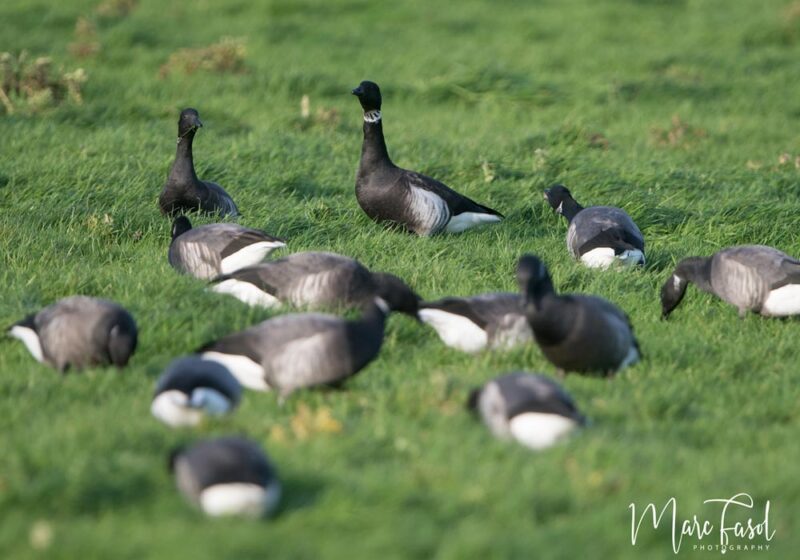
Bernache cravant du Pacifique (Branta bernicla nigricans) (en haut au centre) parmi des Bernaches cravants nominales (B. b. bernicla) à Brughsluis en Zélande (Pays-Bas) le 24 novembre 2024.
Photographie : Marc Fasol / Sa galerie de photos
Introduction
La Bernache cravant (Branta bernicla) est une petite oie sombre. Elle est généralement divisée en trois sous-espèces : la Bernache cravant à ventre sombre ou nominale (B. b. bernicla), la plus commune en Europe en hiver, celle à ventre pâle (B. b. hrota), une hivernante plus rare en Europe, et enfin celle du Pacifique (B. b. nigricans). Cette dernière, qui se distingue principalement de la sous-espèce nominale par son demi-collier blanc plus large, son dos et son ventre plus sombres et l’arrière pâle de ses flancs, est accidentelle et rare en Europe en hiver.
Dans cet article, nous vous présentons les critères pour identifier la Bernache cravant du Pacifique et nous vous indiquons plusieurs bons secteurs pour la rechercher en France en hiver.
Nous remercions tous les photographes qui nous ont aidés à illustrer cet article.
Abstract
The Brent Goose (Branta bernicla) is a small dark goose. It is generally divided into three subspecies: the Dark-bellied or nominate Brent Goose (B. b. bernicla), the commonest in Europe in winter, the Pale-bellied Brent Goose (B. b. hrota), a rarer wintering goose in Europe, and finally the Black Brent Goose (B. b. nigricans). The latter, which is mainly distinguished from the nominate subspecies by its wider white half-collar, its darker back and belly and the pale back of its flanks, is a rare vagrant in Europe in winter.
In this article, we present the criteria for identifying the Black Brent Goose and we indicate several good areas to search for it in France in winter.
We thank all the photographers who helped us illustrate this article.
Trois sous-espèces de la Bernache cravant sont généralement reconnues
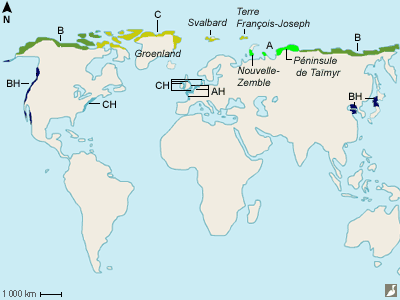
Aires de répartition des sous-espèces de la Bernache cravant (Branta bernicla) : zones de nidification (A) et d’hivernage (AH) de la sous-espèce nominale (B. b. bernicla), de nidification (B) et d’hivernage (BH) de la sous-espèce du Pacifique (B. b. nigricans), et de nidification (C) et d’hivernage (CH) de la sous-espèce à ventre pâle (B. b. hrota). |
La Bernache cravant (Branta bernicla) est divisée en trois sous-espèces par la plupart des auteurs :
- la Bernache cravant nominale ou à ventre sombre (B. b. bernicla), qui niche dans le nord-est de la Sibérie (principalement sur la péninsule de Taïmyr et dans l’archipel de la Nouvelle-Zemble). Elle hiverne dans le nord-ouest de l’Europe et notamment le long des côtes de l’océan Atlantique et de la Manche en France, par exemple dans les baies de Goulven et de Saint-Brieuc (Côtes-d’Armor) (lire Les oiseaux de la réserve naturelle de la baie de Saint-Brieuc), autour des îles de Ré et d’Oléron (Charente-Maritime) (lire Découvrir les oiseaux de l’île d’Oléron) ou dans le bassin d’Arcachon (Gironde) (lire Observer les oiseaux dans la réserve ornithologique du Teich).
- La Bernache cravant du Pacifique (B. b. nigricans), qui niche dans le nord-est de la Sibérie, dans le nord de l’Alaska et dans le nord-ouest du Canada. Elle passe la mauvaise saison en Chine, au Japon, au Mexique (dans la mer de Cortez principalement), dans le nord-ouest de l’Amérique du Nord ainsi qu’en petit nombre le long des côtes du New Jersey.
- La Bernache cravant à ventre pâle (B. b. hrota), qui niche dans les archipels François-Joseph (Sibérie) et du Svalbard, au Groenland et dans le nord-est du Canada. Elle hiverne dans l’ouest du Danemark, dans le nord-est de l’Angleterre (Royaume-Uni), dans le nord de l’Irlande, dans l’ouest du Cotentin (France) et le long des côtes atlantiques des États-Unis (du Maine à la Géorgie) (lire Comment identifier et où observer la Bernache cravant à ventre pâle en France ?).
Certains auteurs reconnaissent une quatrième sous-espèce (B. b. orientalis), qui se reproduit également dans l’Arctique canadien et qui hiverne le long des côtes du Pacifique Nord. Elle est généralement rattachée à la Bernache cravant du Pacifique (B. b. nigricans).
Identification de la Bernache cravant du Pacifique (Branta bernicla nigricans)
Longueur : 56 – 61 cm.
Envergure : 110 – 120 cm.
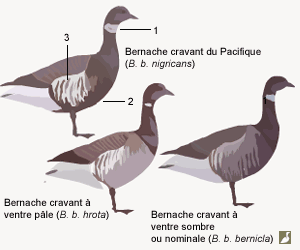
Les trois sous-espèces de la Bernache cravant (Branta bernicla) pouvant être observées en Europe : |
Description : la Bernache cravant du Pacifique (B. b. nigricans) ressemble globalement à la Bernache cravant nominale (Branta b. bernicla). C’est une petite oie sombre à la tête et au cou noirs, à l’arrière du corps blanc, à la queue noire, et aux ailes et au ventre gris sombre.
Elle s’en distingue toutefois (chez les oiseaux typiques) par :
- Son large collier blanc, dont les deux parties latérales se rejoignent devant le cou (chez la sous-espèce nominale, le collier est beaucoup plus mince, s’étendant seulement sur les côtés du cou, mais non jointif). De nombreuses variations sont possibles dans le dessin du collier de la sous-espèce nigricans, mais celui-ci est jointif dans la plupart des cas. Un oiseau au collier non jointif pourrait être un hybride B. b. bernicla x nigricans, dont l’identification peut être problématique, et dont la fréquence serait en augmentation au cours de ces dernières années.
- La coloration brune plus foncée du dos, du ventre et de l’avant des flancs, une teinte qui contraste fortement avec le milieu et l’arrière blanc des flancs (toutefois, quelques traits bruns au bout des plumes blanches sont visibles de près). Quand l’oiseau cherche sa nourriture en basculant l’avant du corps sous l’eau, on ne voit parfois pas de zone sombre entre les pattes. De loin ou par faible éclairage, ces parties foncées paraissent noires, et il y a très peu de contraste avec le noir profond de la tête et de la poitrine.
Des hybrides et des oiseaux « intermédiaires »
Comme nous l’avons évoqué plus haut, il existe des variations de plumage entre individus au sein de cette sous-espèce, ainsi que des hybrides avec la sous-espèce nominale : certains oiseaux ne pourront donc pas être identifiés avec certitude.
Il existe par ailleurs une population intermédiaire entre les sous-espèces à ventre pâle et du Pacifique, appelée Bernache à ventre brun, au génotype a priori assez caractérisé, et dont le phénotype (plumage) est plus ou moins stable et typique. Cette population, dont la taille est estimée entre 7 000 et 15 000 individus, niche sur les îles canadiennes arctiques de la Reine Elisabeth. Elle hiverne principalement le long des côtes nord-américaines de l’océan Pacifique, certains individus s’aventurant sur les côtes atlantiques. Des oiseaux ont été observés en Islande (oiseaux bagués), en Écosse (2021) et en Irlande (2013-2014 et de 2020 à 2023).
Biologie
La Bernache cravant du Pacifique est monogame, formant des couples fidèles. Elle niche sur la toundra côtière des côtes arctiques, et hiverne sur les vasières des côtes (estuaires, baies, marais salants, lagunes). Les familles de l’année migrent ensemble.
En hiver, sa nourriture est composée très majoritairement de zostères (Zostera marina et Z. japonica), des plantes maritimes qui poussent sur les côtes basses adaptées aux eaux salées. Elle peut également se nourrir dans les cultures à l’intérieur des terres.
La population nichant en Colombie-Britannique (Canada) est strictement côtière et ne se nourrit que de zostères tout au long de l’année.
Une sous-espèce accidentelle rare en Europe de l’Ouest
La Bernache cravant du Pacifique niche dans le nord-est de la Sibérie, dans le nord de l’Alaska et dans le nord-ouest du Canada et hiverne en Chine, au Japon, au Mexique (mer de Cortez principalement) et dans le nord-ouest de l’Amérique du Nord. Du fait de ses aires de nidification et d’hivernage très orientales, c’est une sous-espèce accidentelle très rare en Europe de l’Ouest. On suppose que les individus qui sont vus chaque hiver dans des troupes de Bernaches cravants de la sous-espèce nominale proviennent du nord-est de la Sibérie (la sous-espèce nominale niche également en Sibérie).
Par contre, quand elle est repérée au sein d’un groupe de Bernaches cravants à ventre pâle, elle a plus probablement une origine nord-américaine, B. b. hrota nichant principalement au Groenland et au Canada (lire Identifier et observer la Bernache cravant à ventre pâle en France). Cette situation est plus courante au Royaume-Uni qu’en France : en effet, dans l’hexagone, B. b. hrota est une hivernante nettement plus rare, avec seulement environ mille oiseaux, qui séjournent principalement dans les havres du Cotentin (Manche) (lire Observer les oiseaux dans les havres du Cotentin).
Comment repérer une Bernache cravant du Pacifique dans une troupe de Bernaches cravants nominales ?
Outre les critères de plumage évoqués précédemment, des éléments de comportement peuvent aussi être pris en compte pour repérer une Bernache cravant du Pacifique : dans une troupe de Bernaches cravants de la sous-espèce nominale, il n’est pas rare que ces dernières la rejettent en lui donnant des coups de bec. Quand les oiseaux sont dérangés, plusieurs observateurs ont constaté qu’elle s’envolait souvent seule, complètement à l’opposé des autres oiseaux composant le groupe qu’elle accompagnait jusqu’alors. Ces traits de comportement peuvent faciliter la détection d’un possible individu, même s’ils sont quelque peu subjectifs (en effet, la plupart du temps, la cohabitation se passe bien).
|
|
||
|
|
Où rechercher la Bernache cravant du Pacifique en hiver en France ?
La Bernache cravant du Pacifique est rare en France, où elle est à rechercher principalement entre novembre et mars. La plupart des individus sont fidèles à leur zone d’hivernage et sont revus plusieurs années de suite.
Voici une sélection de bons secteurs pour la rechercher en France en hiver :
- Les herbus de Genêts et de Vains, en baie du Mont-Saint-Michel (Manche/Ille-et-Vilaine) (lire Observer les oiseaux en hiver dans les herbus de la baie du Mont-Saint-Michel).
- L’anse d’Yffiniac, dans la réserve naturelle de la baie de Saint-Brieuc (Côtes-d’Armor) (lire Observer les oiseaux dans la réserve naturelle de la baie de Saint-Brieuc).
- Le secteur du Len et de Louannec (Côtes-d’Armor).
- La baie de Goulven et l’anse de Kernic (Finistère) (lire Observer les oiseaux des dunes, vasières et prés salés de l’anse de Kernic).
- Le golfe du Morbihan (Morbihan).
- Les traicts du Croisic et de Pen Bé (Loire-Atlantique)
- Le secteur de La Guérinière, sur l’île de Noirmoutier (Vendée).
- Les secteurs de Loix-en-Ré, d’Ars-en-Ré et des Portes-en-Ré, sur l’île de Ré (Charente-Maritime).
- Les secteurs de la Baudissière, du Dolus d’Oléron et de Château-d’Oléron, sur l’île d’Oléron (Charente-Maritime) (lire Où observer les oiseaux sur l’île d’Oléron).
- L’estuaire de la Seudre (Charente-Maritime).
Les îles de Ré et d’Oléron en Charente-Maritime, et l’île de Noirmoutier en Vendée, sont les plus favorables. Le bassin d’Arcachon (Gironde) est rarement mentionné, mais ceci est dû à la grande distance d’observation des bernaches, qui rend la détection d’une Bernache cravant du Pacifique plus aléatoire.
C. Barrier, membre de l’association GONm (Groupe Ornithologique Normand), nous a apporté la précision suivante : « parmi les secteurs où on peut voir la Bernache cravant du Pacifique dans le département de la Manche, on peut citer également la côte orientale du Cotentin, et plus particulièrement la rade de Tatihou à Saint-Vaast-la-Hougue. Sur cette côte, plus de 1 000 Bernaches cravants hivernent tous les ans (1 429 à la mi-février 2007) et la sous-espèce B. b. nigricans peut y être observée pratiquement chaque année. Un individu (au moins), était par exemple présent depuis la mi-novembre 2006, et il a été vu et photographié le 21 février 2007 sur la réserve de l’île de Tatihou (gérée par le GONm), où plus de 1 000 Bernaches cravants s’étaient regroupées pour pâturer.
Une vidéo d’une Bernache cravant du Pacifique parmi des Bernaches cravants nominales
Bernache cravant du Pacifique (Branta bernicla nigricans) parmi les Bernaches cravants nominales (B. b. bernicla) à Ouddorp (Pays-Bas) en janvier 2024.
Source : Edouard Dansette
Réagir à notre article
Compléments
Dans la rubrique Observations d’Ornithomedia.com
- Bernache cravant à ventre pâle (Branta bernicla hrota)
- Bernache cravant du Pacifique (Branta bernicla nigricans)
Dans la galerie d’Ornithomedia.com
- Bernache cravant (Branta bernicla bernicla)
- Bernache cravant à ventre pâle (Branta bernicla hrota)
- Bernache cravant du Pacifique (Branta bernicla nigricans)
Ouvrages recommandés
- Le guide Ornitho de Killian Mullarney et al
- Ducks, Geese and Swans de Janet Kear




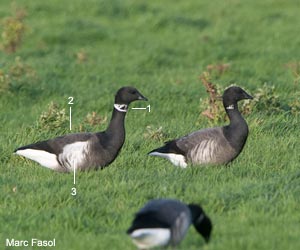
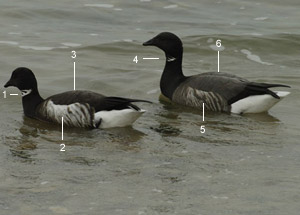
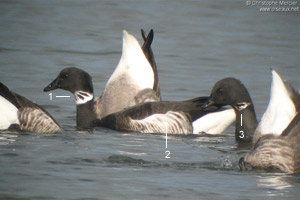
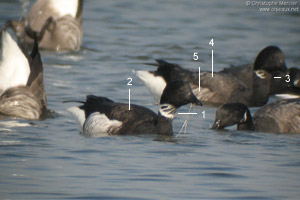
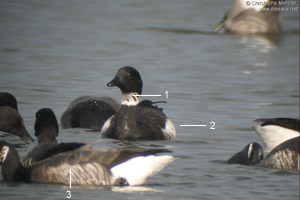
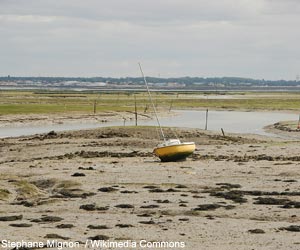
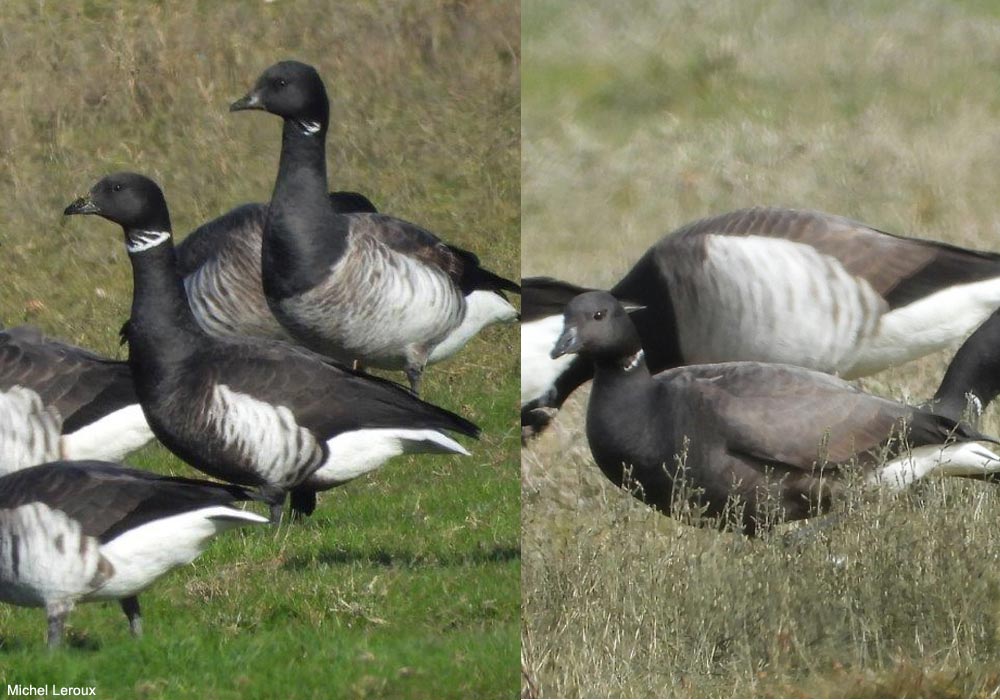
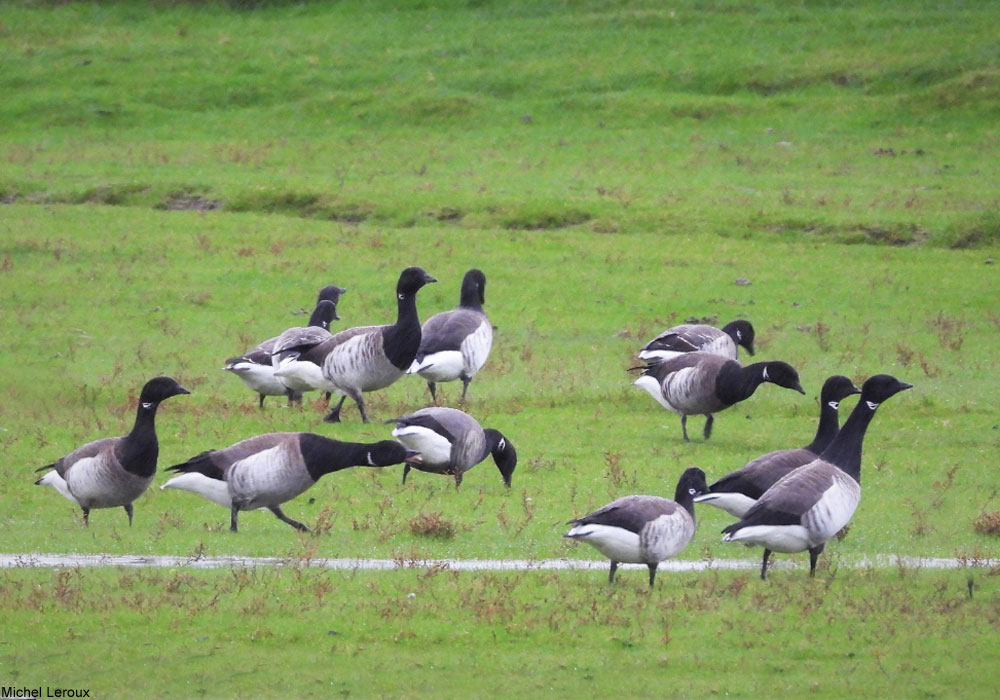
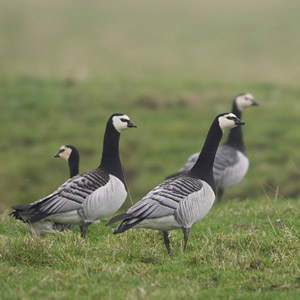
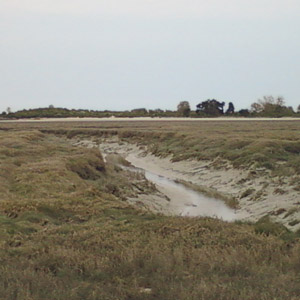
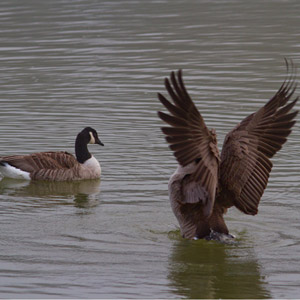
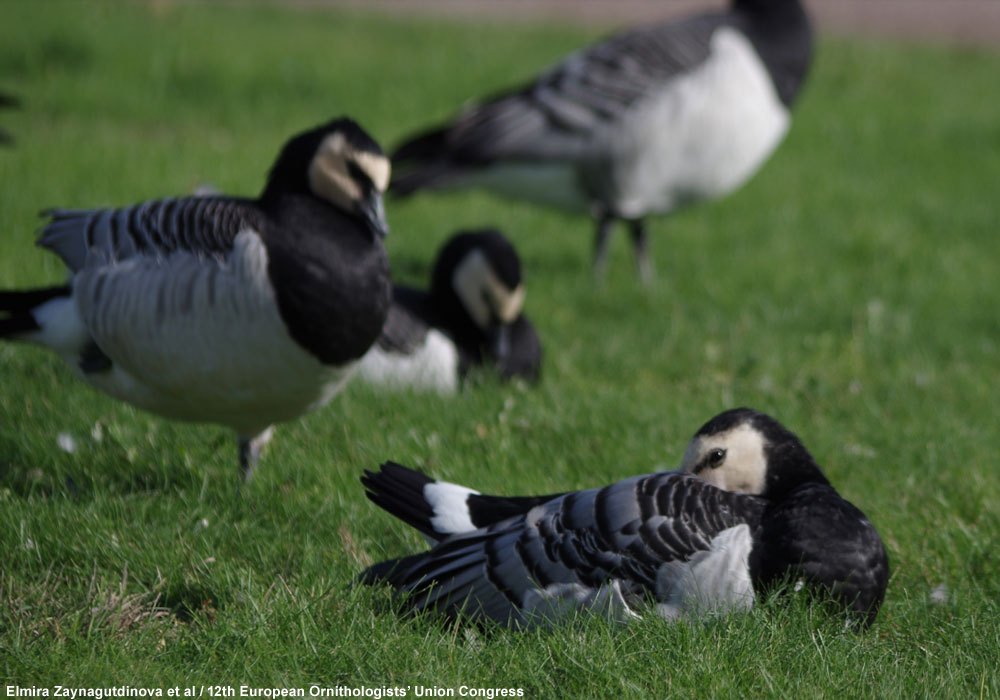
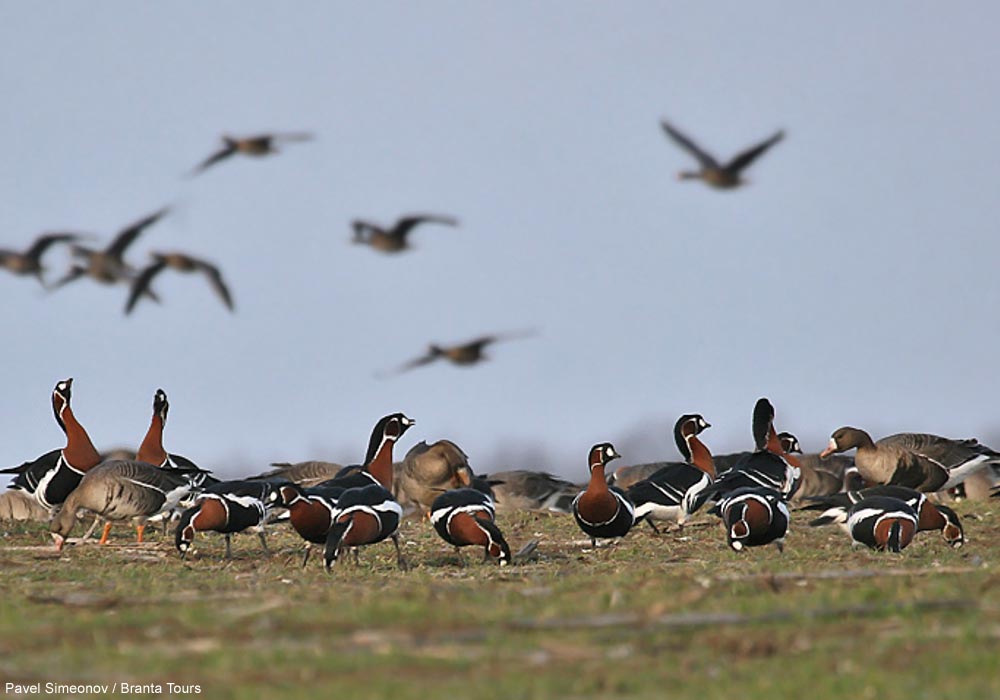
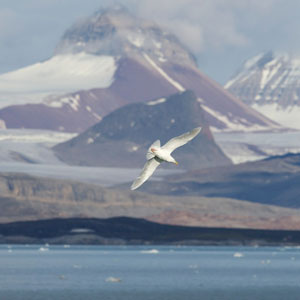
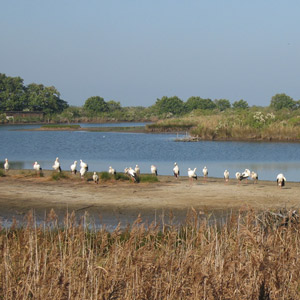
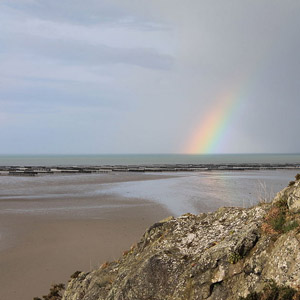
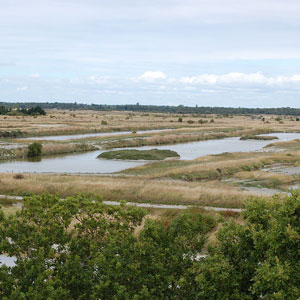
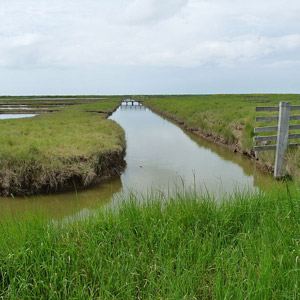
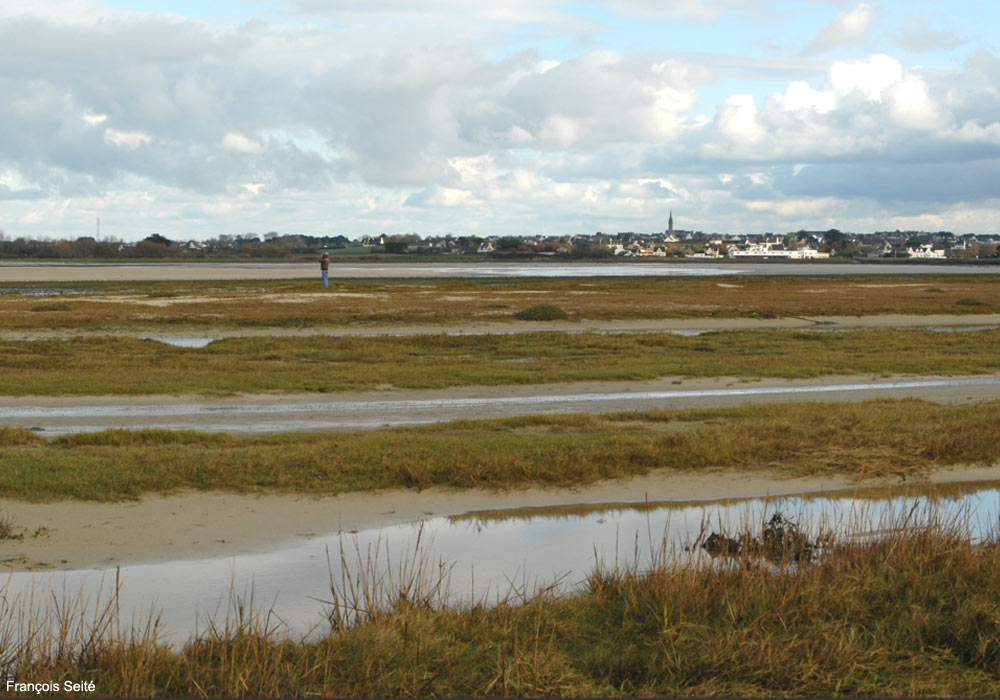
Aucun commentaire sur ce sujet
Participer à la discussion !